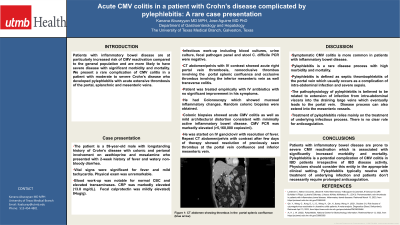Monday Poster Session
Category: IBD
P2249 - Acute CMV Colitis in a Patient With Crohn’s Disease Complicated by Pylephlebitis: A Rare Case Presentation
Monday, October 23, 2023
10:30 AM - 4:15 PM PT
Location: Exhibit Hall

Has Audio

Kanana Aburayyan, MD
University of Texas Medical Branch
Galveston, TX
Presenting Author(s)
Kanana Aburayyan, MD, Jose Aguirre, MD
University of Texas Medical Branch, Galveston, TX
Introduction: Patients with inflammatory bowel disease (IBD) are at increased risk of cytomegalovirus (CMV) reactivation. We present a rare complication of CMV colitis in a patient with moderate to severe Crohn’s disease who developed pylephlebitis. Pylephlebitis is a rare disease entity in which extension of intra-abdominal infection into the portal circulation results in portal vein thrombosis that can potentially extend to the splanchnic vein and eventually to the mesenteric veins.
Case Description/Methods: A 59-year-old male with history of Crohn’s disease presented with a 2-week history of fever and watery diarrhea. Labs were remarkable for elevated liver enzymes, markedly elevated C-reactive protein, and mildly elevated fecal calprotectin. CT abdomen/pelvis with IV contrast showed a thrombus involving the portal splenic confluence and the inferior mesenteric vein as well as transverse colitis. CMV viral load was elevated. Colonoscopy with biopsies showed acute CMV colitis. He was started on ganciclovir with resolution of fever. Repeat CT abdomen/pelvis a few days later showed resolution of previously seen thrombus at the portal vein and the inferior mesenteric vein. CMV viral load normalized. Repeat colonoscopy with biopsies after completion of therapy showed resolution of CMV.
Discussion: Symptomatic CMV colitis is common in patients with IBD and is associated with high mortality and morbidity. In our case, the patient developed pylephlebitis in the setting of acute CMV colitis. Pylephlebitis is defined as septic thrombophlebitis of the portal vein which occurs due to the extension of infection from intra-abdominal viscera into the draining large veins which leads to the portal vein. The most involved organisms are gram-negative aerobes, anaerobes, and Streptococcus species but in many cases, no organism is isolated. Patients usually present with fever, nausea, vomiting and abdominal pain. Laboratory work-up typically shows elevated liver enzymes. Diagnosis is usually made by evidence of portal thrombosis on abdominal imaging in the appropriate clinical setting. Treatment of pylephlebitis relies mainly on the treatment of underlying infection. There is no clear role for anticoagulation in the treatment of pyelonephritis. Physicians should consider this rare entity in the appropriate clinical setting. Pylephlebitis typically resolves with treatment of underlying infection and the patients don’t necessarily require anticoagulation.

Disclosures:
Kanana Aburayyan, MD, Jose Aguirre, MD. P2249 - Acute CMV Colitis in a Patient With Crohn’s Disease Complicated by Pylephlebitis: A Rare Case Presentation, ACG 2023 Annual Scientific Meeting Abstracts. Vancouver, BC, Canada: American College of Gastroenterology.
University of Texas Medical Branch, Galveston, TX
Introduction: Patients with inflammatory bowel disease (IBD) are at increased risk of cytomegalovirus (CMV) reactivation. We present a rare complication of CMV colitis in a patient with moderate to severe Crohn’s disease who developed pylephlebitis. Pylephlebitis is a rare disease entity in which extension of intra-abdominal infection into the portal circulation results in portal vein thrombosis that can potentially extend to the splanchnic vein and eventually to the mesenteric veins.
Case Description/Methods: A 59-year-old male with history of Crohn’s disease presented with a 2-week history of fever and watery diarrhea. Labs were remarkable for elevated liver enzymes, markedly elevated C-reactive protein, and mildly elevated fecal calprotectin. CT abdomen/pelvis with IV contrast showed a thrombus involving the portal splenic confluence and the inferior mesenteric vein as well as transverse colitis. CMV viral load was elevated. Colonoscopy with biopsies showed acute CMV colitis. He was started on ganciclovir with resolution of fever. Repeat CT abdomen/pelvis a few days later showed resolution of previously seen thrombus at the portal vein and the inferior mesenteric vein. CMV viral load normalized. Repeat colonoscopy with biopsies after completion of therapy showed resolution of CMV.
Discussion: Symptomatic CMV colitis is common in patients with IBD and is associated with high mortality and morbidity. In our case, the patient developed pylephlebitis in the setting of acute CMV colitis. Pylephlebitis is defined as septic thrombophlebitis of the portal vein which occurs due to the extension of infection from intra-abdominal viscera into the draining large veins which leads to the portal vein. The most involved organisms are gram-negative aerobes, anaerobes, and Streptococcus species but in many cases, no organism is isolated. Patients usually present with fever, nausea, vomiting and abdominal pain. Laboratory work-up typically shows elevated liver enzymes. Diagnosis is usually made by evidence of portal thrombosis on abdominal imaging in the appropriate clinical setting. Treatment of pylephlebitis relies mainly on the treatment of underlying infection. There is no clear role for anticoagulation in the treatment of pyelonephritis. Physicians should consider this rare entity in the appropriate clinical setting. Pylephlebitis typically resolves with treatment of underlying infection and the patients don’t necessarily require anticoagulation.

Figure: CT abdomen showing thrombus in the portal splenic confluence
Disclosures:
Kanana Aburayyan indicated no relevant financial relationships.
Jose Aguirre indicated no relevant financial relationships.
Kanana Aburayyan, MD, Jose Aguirre, MD. P2249 - Acute CMV Colitis in a Patient With Crohn’s Disease Complicated by Pylephlebitis: A Rare Case Presentation, ACG 2023 Annual Scientific Meeting Abstracts. Vancouver, BC, Canada: American College of Gastroenterology.
